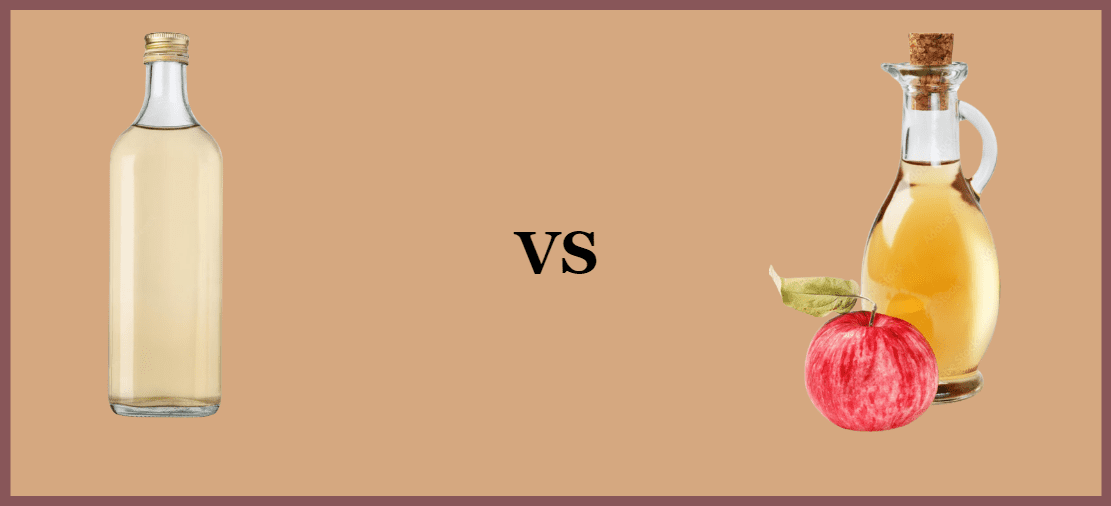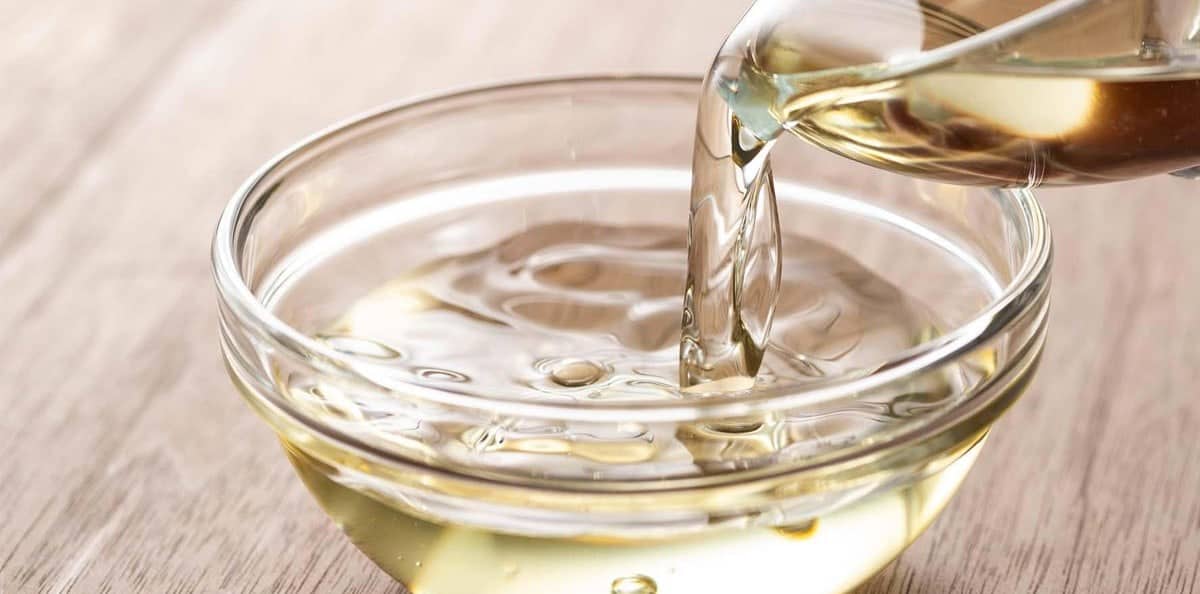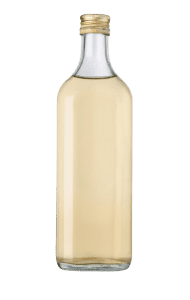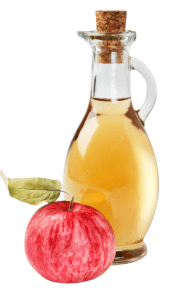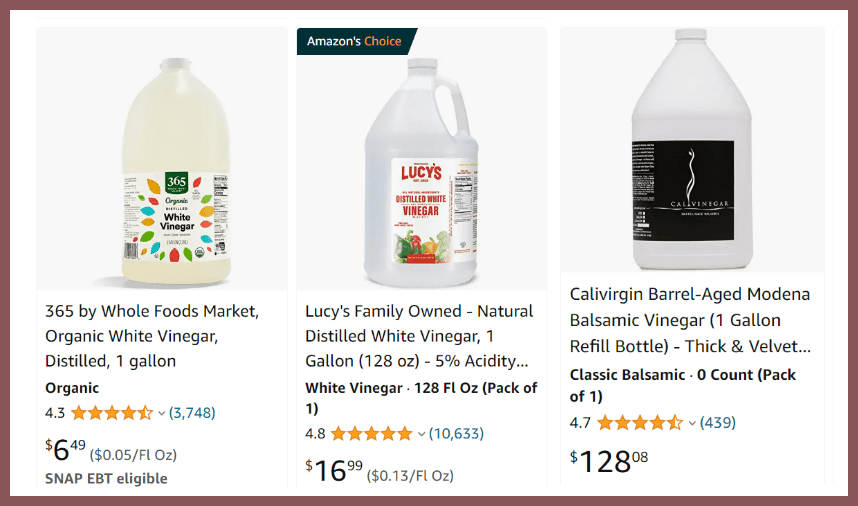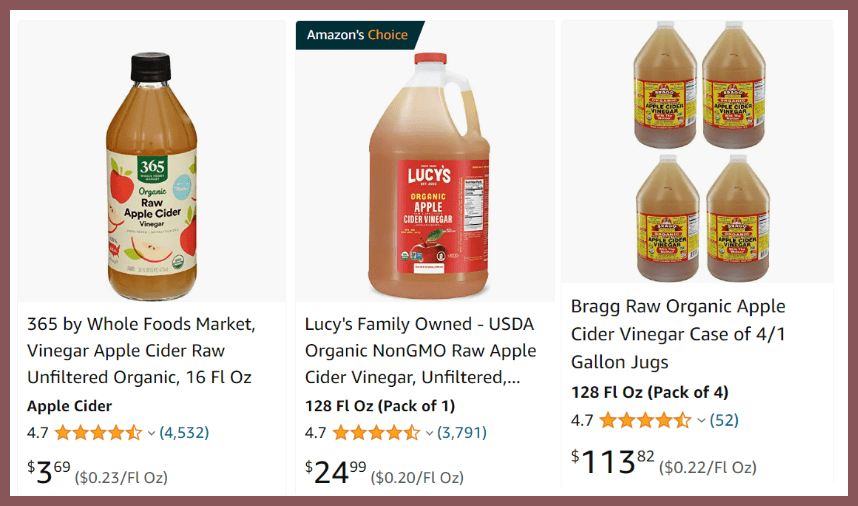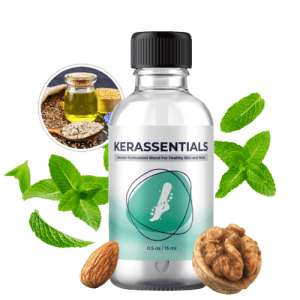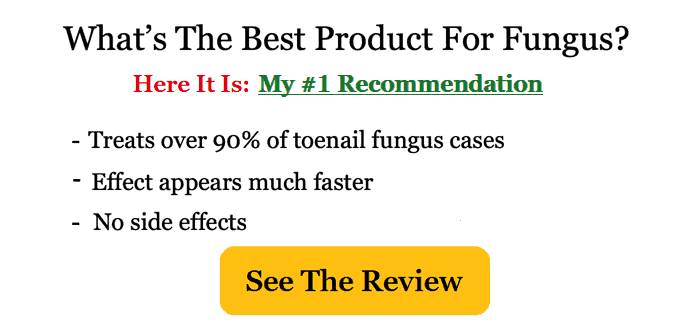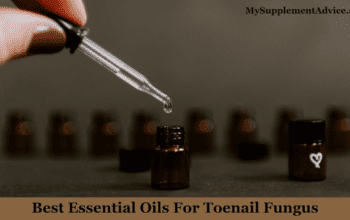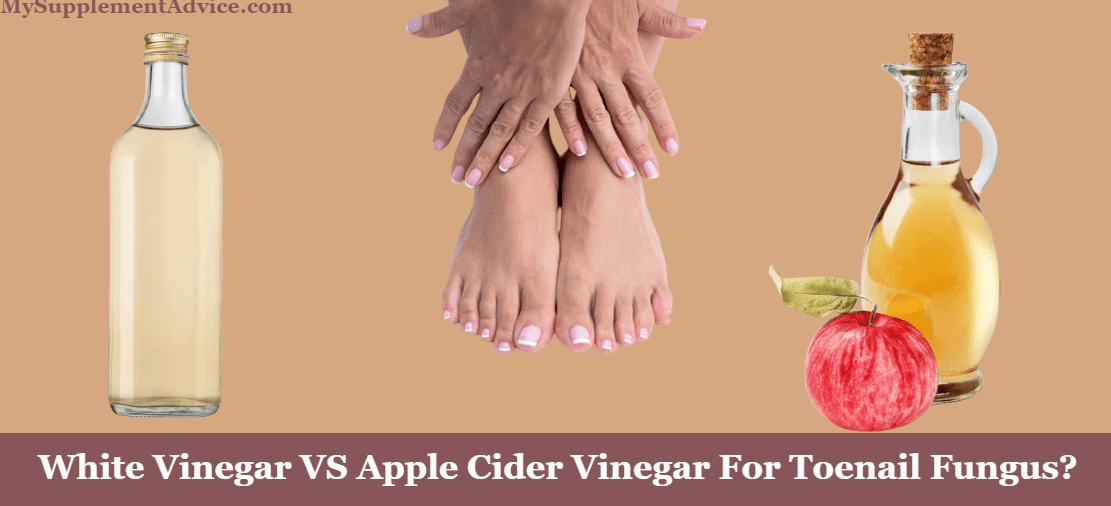
Let us compare White Vinegar VS Apple Cider Vinegar for toenail fungus.
You may know that vinegar is praised on the Internet for its anti-fungal properties.
However, let's get more specific.
Which type of vinegar is best to use against toenail fungus?
- How are white vinegar and ACV different from each other?
- Is one stronger than the other?
- Which one should you choose?
Let's look at the main aspects of these two types of vinegar.
That way, you will know if they are worth your time at all.
Note: This review is based on my research on these 2 ingredients.
White VS Apple Cider Vinegar? (In A Nutshell)
While carefully looking into each of them, Apple Cider Vinegar comes out on top.
In short – here's why it's better for toenail fungus:
- strong effect
- antifungal properties
- gentle enough to not irritate
- not too acidic
- low risk of side effects
- very accessible price
If you want to nitpick, White Vinegar is actually stronger than ACV.
While this is true, don't let this aspect entice you too much.
Having a more potent formulation also implies a higher risk of side effects.
For this reason, I believe Apple Cider Vinegar wins on all fronts:
- offers a strong effect
- yet remains gentle enough
- this makes it much safer
In other words, ACV gives you the best of both worlds.
Now – be aware that studies have not verified vinegar's efficacy on a fungal infection in the human body.
Because of this, I can't assure you that ACV is enough to remove the fungus.
However, if you want to get rid of the mycosis once and for all…
I highly recommend an anti-fungal treatment formulated specifically for this.
On that note, have you heard of Kerassentials?
It's a topical treatment that has all the right ingredients to eliminate the root of your issue.
#1 – Potency & Strength – WINNER: ACV
This is probably one of the most important aspects to consider when making your choice.
Let's look at the following details:
- what each type of vinegar does
- how strong each of them is
In short, ACV is the superior option:
- contains less acetic acid
- this means its acidity is milder than that of white vinegar
- at the same time, it's also safer
Generally speaking, white vinegar and ACV are not all that different.
But there are subtle details that should help you lean towards one of them.
In this case, it would be in favor of Apple Cider Vinegar.
But let's take a look at each of them individually.
1. White Vinegar
Here are the main aspects of white vinegar:
- has no color
- 4-7% of acetic acid [1]
- made from the fermentation of grain alcohol
- mostly used for cleaning
- good for meal & vegetable preservation
Keep in mind that white vinegar is known as a more aggressive type of vinegar.
This is because it can have up to 20% acetic acid.
However, this is very dangerous:
- such variants are not safe for human consumption
- they are mainly used for cleaning
Thus, if you are looking for something on the harsh side…
White vinegar is what you're looking for.
Just know that the potency comes with the risk of side reactions, however.
2. Apple Cider Vinegar
Here's what you should know about ACV:
- has a brown/amber shade
- contains about 5% to 6% of acetic acid [2]
- made from a two-step fermentation process of the liquid of crushed apples
- used as dressing in salads & cleaning around the house
- has more nutritional value due to the fruit
Now, while the amount of acetic acid is similar to white vinegar…
ACV does not have such a high ceiling for this component.
This means that Apple Cider Vinegar is overall much gentler.
So, if you are looking to minimize the risk of adverse reactions, this is your best bet.
Its formulation is balanced enough to where it shouldn't cause issues.
Of course, this also implies that you don't go overboard with it.
Conclusion
In short, it seems like white vinegar is not excessively different from ACV.
However, if you're looking for a stronger effect, there's a trade-off.
This means you might have to put up with potential side effects.
For this reason, I recommend ACV.
It has a lower amount of acetic acid, meaning its acidity is manageable.
So, it shouldn't cause nearly as many issues.
#2 – Clinical Studies & Research – WINNER: ACV
Time to ascertain what research says about each type of vinegar:
- how attractive the advantages are
- any compromises you should be ready for
To reiterate – ACV and white vinegar are not vastly different on this front.
However, the former tends to get more attention.
For that reason, I am choosing ACV as the winner in this specific section.
This is simply because the interest surrounding it leads to more clinical trials.
1. White Vinegar
First off, let's take a look at what white vinegar has to offer.
In short, here is what studies have to say in this regard:
- antimicrobial properties [3]
- good for treating warts, ear infections, and fungus
- also effective for burns and other skin infections [4]
This is the gist of what white vinegar does in terms of (toenail) fungus.
Of course, you can use it by pouring it on your salads or applying it straight to your infection using a Q-tip.
If you find that your skin is particularly sensitive, consider diluting it with some water.
In any case, make sure you are using the 5% acetic acid version.
A higher dose is rather dangerous.
2. Apple Cider Vinegar
Let's now look at what ACV does for your toenail fungus, shall we?
Allow me to give you a brief summary:
That's about what you should expect from Apple Cider Vinegar.
As you can see, it is much more centered around fungus.
Not to mention that it is also arguably more popular than white vinegar.
This explains why people are more interested in ACV's potential benefits.
Plus, it has a much more approachable taste & scent, compared to white vinegar.
As such, it makes the more accessible option out of the two.
Not to mention that it also has a gentler effect.
Conclusion
It just so happens that studies are more inclined to focus on ACV.
Due to this reason, there is more to be read about its effects on fungus.
Still – remember that there are no concrete results when it comes to how these types of vinegar act on a fungal infection in the human body.
For this reason, both options weigh around the same when it comes to this aspect.
Nonetheless, I picked ACV as the winner because there are more studies regarding fungus in regards to it.
#3 – Side Effects – WINNER: Apple Cider Vinegar
On the topic of side reactions, we already addressed this, although briefly.
But let's get into more details.
After all, it is essential for the safety of your well-being.
1. White Vinegar
For the most part, white vinegar is safe and shouldn't cause problems.
However, this changes if you go overboard with it:
- indigestion & heartburn
- degradation of tooth enamel (if consumed orally) [7]
- dangerous drug interaction with medication related to blood sugar and/or the heart
Of course, also take into account that white vinegar is generally more acidic.
In the grand scheme of things, it is known as one of the stronger types of vinegar out there.
This may sound enticing, but know that a high amount of acetic acid can also irritate your skin.
Depending on your sensitivity, it can be even worse.
Because of this, I don't think it's the best option.
2. Apple Cider Vinegar
Here's what you should know about ACV's side effects:
- burning sensation in your throat (because of acidity)
- eroding tooth enamel
In extreme cases, it can lead to more precarious situations.
For example, constipation and lightheadedness.
Of course, this only applies if you exaggerate with ACV.
Normally, you should not run into any issues.
This is mostly because this type of vinegar is more manageable in terms of acidity.
In other words, it does not contain as much acetic acid.
This fact alone makes ACV much better in terms of side reactions.
Plus, it's also why I keep saying that it has a more subdued effect.
Conclusion
If you're looking for the option that is less likely to endanger your health…
I would say Apple Cider Vinegar is your safest bet.
It contains 5-6% of acetic acid, which is way less than the 25% that may be found in white vinegar.
While this means it is also softer in taking action…
It also poses fewer risks of triggering adverse reactions.
#4 – Price – WINNER: Apple Cider Vinegar
Let's now look at which version of vinegar gives you a better deal.
So – which is more affordable?
At the same time, we will look at whether the price is worth it.
Let's see: is it best to go for the affordable option…
Or are you better off paying up for the most favorable results?
1. White Vinegar
For this, I went to Amazon to check the fluctuations in price when it comes to white vinegar.
Honestly, given that vinegar is such a versatile ingredient…
It makes sense that there are lots of options available.
That being said, you can find this product for all sorts of prices:
- lowest price is $2.47 for 32 fl. oz.
- highest one is $128.08 for 1 gallon
As you can see, white vinegar tends to go rather high in terms of price.
Of course, you can get a perfectly fine option for an affordable price…
But it is interesting to note that it can even reach the price of $128.08.
If you are looking for fancier versions of white vinegar, there is a market for that.
However, it is definitely not necessary for the purpose of treating toenail fungus.
Still – as you are about to see, this is a little bit more expensive than ACV.
2. Apple Cider Vinegar
Due to the popularity of ACV, expect to have a large array of options.
Allow me to give you a brief view of the prices:
- lowest price is $1.65 for 16 oz.
- highest price is $113.82 for 1 gallon (pack of 4)
As you can see, ACV is very accessible in terms of price.
Even the highest price is not that high when you take into account that it's a pack of 4.
That brings the price of one jug to $28.45.
Clearly, that is much better than the highest price you can pay for white vinegar.
That being said, it also helps that Apple Cider Vinegar is widely available.
This ensures that you can buy it for all sorts of prices.
Even if you are looking for something more expensive, this vinegar is quite forgiving.
Conclusion
If you are looking to spend as little money as possible…
Apple Cider Vinegar is definitely the best option.
Regardless of whether you are looking for something fancy or very affordable…
There is nothing that will cause you to break the bank.
So rest assured that ACV is by far the most comfortable choice from this perspective.
My Verdict – White Vinegar Or Apple Cider Vinegar?
Short answer: Apple Cider Vinegar – it surpasses white vinegar in many ways.
Let me go over the reasons why I'm recommending it:
- strong enough but doesn't cause irritation
- better for treating fungus
- manageable level of acidity
- doesn't cause major side reactions
- more affordable
To its credit, white vinegar may be stronger in its effect…
But that's because it has a higher level of acidity, which comes with risks.
Honestly, I don't think it's worth choosing it, especially if your skin is sensitive.
In truth, vinegar has not been proven to treat a fungal infection in the human body…
Without being supplemented with something stronger.
Now – Apple Cider Vinegar should not pose any threats to you.
At the same time, you also shouldn't expect miracles by just using this ingredient.
If you want to remove toenail fungus quickly and effectively…
I recommend going for a ready-made product that is formulated for this purpose.
That being said, would you like to take a look at my #1 recommendation?
Allow me to introduce you to Kerassentials:
- complex & all-natural formula
- eliminates the infection from the root
- destroys fungal buildup
- extremely safe
- very easy to use
While Kerassential does not have ACV in its composition…
It surely has top-notch ingredients that have scientifically proven anti-fungal properties.
This is precisely what makes it very effective.
That being said, you will surely see the difference once you give this product a try.
It is more than worth it!
References:
1 – https://www.ncbi.nlm.nih.gov/pmc/articles/-PMC1785201/
2 – https://pubmed.ncbi.nlm.nih.gov/-27979138/
3 – https://ift.onlinelibrary.wiley.com/doi/full/10.1111/-1750-3841.12434
4 – https://pubmed.ncbi.nlm.nih.gov/-23999348/
5 – https://www.ncbi.nlm.nih.gov/pmc/articles/-PMC8369171/

